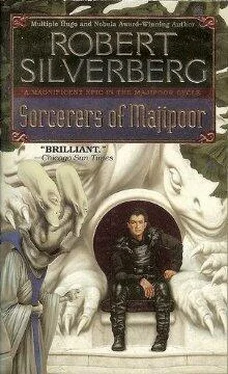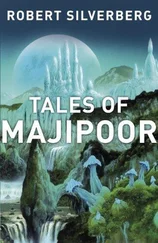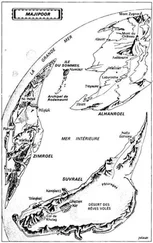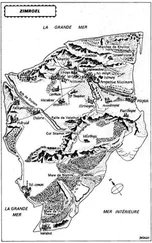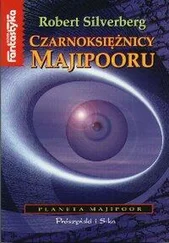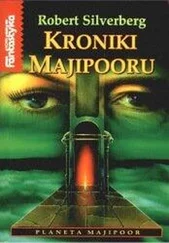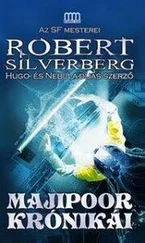“Even Serithorn!” Prestimion said. “Gonivaul I can understand: he’s never been a great friend of mine. Oljebbin, well, he’s cousin to Korsibar’s father, after all. But Serithorn—Serithorn—”
“This is Dantirya Sambail’s doing,” said Septach Melayn. “Since the breaking of the dam, he’s been at the Castle, stirring up the lords into confusion. Surely they’re all frightened of opposing him. If Dantirya Sambail has cast in his lot with Korsibar, how can they dare do otherwise?”
“Which says much for the power of family ties,” Duke Svor observed. “For the Procurator, as I recall, is some cousin of yours, is he not, Prestimion?”
“A very distant one,” replied Prestimion. “And growing more distant every hour. Well, it makes no difference, a few more private armies here and there standing with Korsibar. The people are with us, eh? The world’s had nothing but trouble since Korsibar made himself Coronal, and everyone knows it. The hands of citizens lifted against citizens, the crops falling off because men are marching up and down bearing weapons when they should be tilling the fields, the government in paralysis—an inept Coronal and a bewildered Pontifex—”
“There’s the most pitiful thing of all,” said Gialaurys. “Old Confalume who was such a splendid Coronal, now reduced to wreck and ruin as he hides in the Labyrinth while his magnificent worthless son brings the world down around himself What must he think? I feel such sorrow, that Confalume’s great reign should have ended in this miserable turmoil.”
Svor said, “Perhaps he perceives very little of what’s been going on. I like to think that some magus of Korsibar’s—Sanibak-Thastimoon, most likely—has cast a perpetual veil over his mind, and the old man goes through his days and nights as though in a dream. But it’s sad all the same, for those of us who remember what Confalume once was.”
“Sad indeed, Svor. What a strange road we’ve all traveled since then!—Yes, boy?” Prestimion said.
A messenger had come running up, bearing a rolled scroll in his hand. Prestimion took it from him and read it through.
“A new edict from Lord Korsibar, is it?” Septach Melayn asked.
“No, nothing like that. It’s from our venerable maguses Gominik Halvor and his son. They’ve cast the runes for our enterprise. The most auspicious place for us to engage Korsibar in battle, they say, is between the Trikkalas and the Mount, at a place called Thegomar Edge, by Stifgad Lake in the province of Ganibairda.”
“I know that place,” said Gynim of Tapilpil. “We reach it by way of Sisivondal, and southeastward from there in the direction of Ludin Forest The people there raise stajja and lusavender, and other such basic things. That’s where your strongest support lies, my lord, with the fanning folk who want nothing more than for the world to return to normal.”
“Then we’ll take ourselves to Thegomar Edge,” Prestimion said, “and invite Korsibar to visit us there.”
“Tell me, Prestimion,” said Septach Melayn, “do the good mages offer us any reading of the omens foretelling the success of our venture?”
“Oh, yes,” Prestimion said, with the quickest of glances at the scroll in his hand, a mere flick of his eyes. “Everything augurs favorably for us. On our way, then! The province of Ganibairda! Stifgad Lake! Thegomar Edge!”
The eastward march had something of the character of a grand processional about it for Prestimion. The people of the cities along his path hailed him almost everywhere as a liberator as he rode in an open floater in their midst with Thismet beside him, and cheered him onward to his rendezvous with Korsibar.
These were the people who had felt such fear when news first went out that the Pontifex Prankipin was dying; and those fears had proved to be justified. Trouble of some sort would follow the old emperor’s death, they had believed; and the trouble had come. Their maguses had told them there would be chaos, and there was. From every province came reports of factional strife, diminished crops, widespread anxiety and even panic.
It was clear to Prestimion that the people of Majipoor were sorely weary by now of the strife between the rival kings, which had brought such harm to the general prosperity in this time of uncertainty and hostility. And also he saw that the enormity of Korsibar’s sin in appointing himself Coronal had belatedly had its impact on the common folk of the world. A growing number of them now understood Korsibar to be the author of their troubles, and not just those who subscribed to the tale of his being a secret Shapeshifter, though there were plenty enough of those. There was no one who did not desperately want the world to be restored. They looked to Prestimion as the one to put things in balance.
And also there were the nightly sendings of the Lady Kunigarda, attacking Korsibar and Confalume and praising Prestimion. Kunigarda’s words still carried great weight in the world, especially since the new Lady of the Isle, Roxivail, had not yet begun to speak to their minds. Roxivail had taken possession of the Isle, it seemed, but she had not yet managed to establish herself there in the functions of the Lady.
Despite all these things in his favor, Prestimion felt no assurance that the crown of Majipoor was going to topple into his hand like ripe fruit from a tree. The people might be with him, yes. Popular support for his cause might well be increasing every day. But there was no automatic victory in that It still remained for him to deal with the full power of Korsibar’s army. An awesome foe waited for him in the east.
* * *
The journey east retraced of necessity much of the route that Thismet and Melithyrrh had taken during their flight from the Castle. The women were not at all pleased at seeing all those drab rural places that once again stirred such dark memories of hardship in them, but there was no help font, and at least they were traveling this time in more comfort and safety than before. One city after another went by Khatrian, Fristh, Drone, Hunzimar—Gannamunda, Kessilroge, Skeil—they were in the dry dusty plateau of Sisivondal now, and then Sisivondal city.
At Sisivondal, that dreary place of giant warehouses of a single design, where the streets were lined with grim dull camaganda palms and prosaic lumma-lumma bushes by way of decoration, the cultists who went by the name of the Beholders staged a great festival for Prestimion, what they called the Procession of the Mysteries. It would have been a grave insult to refuse, and so he let himself be given the place of honor as the singers and dancers came forth, the girls in white who scattered halatinga blossoms on the ground, the giantess in winged costume who bore the two-headed holy wooden staff, the veiled initiates with waxed and shaven heads.
The mayor of the city explained each step in the ceremony to him, and Prestimion nodded solemnly and watched with the greatest show of deep interest Impassively he looked on, saying little, as the sacred implements of the Beholders were carried before him, the lamp of flame, the serpent of palm fronds, the disembodied human hand with the middle finger bent backward, and the enormous male organ carved from wood, and all the rest Even after Triggoin, Prestimion found these things unsettling. There was a madness to the frenzy of the dancers, and a strangeness to the objects they revered, that were difficult for him to accept.
“Behold and worship!” the marchers cried.
And, while Prestimion watched in silence, from the onlookers came an answering cry: “We behold! We behold!”
The Ark of the Mysteries was next, carried on a wooden pole by two great Skandars, and then, on his cart of ebony and silver, the masked Messenger of the Mysteries himself, naked, painted black down one side and gold down the other, carrying the serpent-entwined staff of his power in one hand and a whip in the other.
Читать дальше
